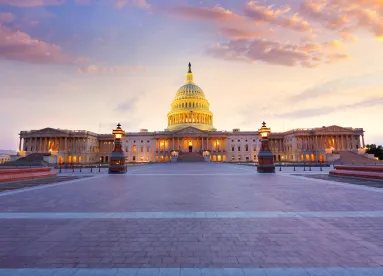US Treasury Secretary Steven Mnuchin, who has been the lead domestic policy negotiator for President Donald Trump and his administration during the COVID-19 crisis, made clear in testimony Wednesday to congressional lawmakers that the White House believes passage of another major coronavirus response package will be necessary soon, notwithstanding a generally positive national jobs report received last Friday from the US Department of Labor’s Bureau of Labor Statistics (BLS). Secretary Mnuchin’s testimony coincided with comments to reporters by Federal Reserve Board Chairman Jerome Powell, who indicated action by Congress is needed and will be more effective if provided soon. Urgency for additional federal action to further bolster the economy is also being supplied by fresh data indicating the pandemic has been particularly brutal for black Americans, widening racial disparities in income across the country and wiping out years of progress that had been made in closing such gaps.
Powell, who has previously demurred when asked to comment on when Congress must act on an additional COVID-19 response bill, told reporters “you’d see better results sooner” if Republicans and Democrats come together this summer to enact additional measures. Relief legislation from Congress “can make a critical difference, not just in helping families and businesses in a time of need, but also in limiting long-lasting damage to our economy,” he added.
Chairman Powell, who was appointed by President Trump in 2017 to the nation’s most important monetary policy job, noted the pandemic-inflicted US recession has disproportionately hurt minority communities. He concluded his prepared remarks with a condemnation of racism, declaring: “Everyone deserves the opportunity to participate fully in our society and our economy.”
In a story published Tuesday bearing the headline “Coronavirus Obliterated [the] Best African-American Job Market on Record,” the Wall Street Journal’s Eric Morath and Amara Omeokwe reported:
The black unemployment rate, which at 5.8% in February was near the lowest since records began in 1972, tripled to 16.8% in May, according to the Labor Department. . .Even when unemployment was low, African-Americans’ overall economic situation was fragile. As a group, they had less job security and wealth than whites, leaving them especially vulnerable when the economy shut down. That now weighs on their prospects as the steepest economic contraction since the 1930s shows signs of turning. Historically, African-Americans’ recovery from recessions has been much slower than those of other groups.”
The number of confirmed cases of COVID-19 in the US has passed the 2 million mark, based on data compiled by Johns Hopkins University.
Secretary Mnuchin, in an appearance before the Senate Committee on Small Business, said that if he were given the opportunity to unilaterally craft the next COVID-19 response measure, he would give priority to providing money directly to individuals to spark economic activity; providing incentives for enterprises to rehire and retain workers; giving new relief to travel, entertainment and restaurant industries; and addressing the upcoming expiration of the enhanced unemployment benefits provided by Congress this past spring. Equally notable are some of the items the Secretary did not identify as priorities, including a reduction in capital gains taxes and significant national infrastructure investments, both of which have appeared on speculative White House wish lists for the next package at various points in the past.
Seeking consensus on actions that could further assist in reviving the battered US economy, policymakers are offering an array of ideas for further modifying or expanding the Paycheck Protection Program (PPP) created by the March 27 Coronavirus Aid, Relief & Economic Security (CARES) Act. Among the ideas: allowing enterprises to seek a second PPP loan, and permitting them to deduct expenses paid for by such loans, POLITICO reports.
Tax and Economic Development Updates
Yesterday, the Federal Reserve released the economic and target federal funds rate projections made by the Federal Open Market Committee during its June 9-10 meeting. According to these projections, the US economy will contract by 6.5% during 2020 and unemployment is likely only to reach – under a best-case scenario – 9.3% by the end of the year, down from 13.3% last month. As a result, the Federal Reserve expects to keep interest rates near 0% through at least 2022. As Federal Reserve Chairman Jerome Powell stated in releasing this information, “[t]his is the biggest economic shock, in the U.S. and in the world, really, in living memory…[i]f there were more fiscal support, you’d see better results sooner….But that’s a question for Congress.”
Notably, in tandem with the Federal Reserve’s calls for additional fiscal support, yesterday, Treasury Secretary Steven Mnuchin made clear that the administration understands “we are going to need another bipartisan legislation to put more money into the economy.” During his testimony before the Senate Committee on Small Business, the Treasury Secretary highlighted a number of key priorities that he would like to see included in any forthcoming legislation, noting that “[w]hatever we do going forward needs to be much more targeted, particularly to the industries and small businesses that are having the most difficulty in reopening as a result of COVID-19,” such as the tourism, travel, and restaurant industries. One option for such targeted relief is a potential bipartisan, bicameral bill that could be introduced as early as this week by Senator Roger Wicker (R-MS) and Representative Earl Blumenauer (D-OR), which would create a US$120 billion fund to provide grants for restaurants (which are not publicly traded or part of a chain with more than 20 locations) that are in need of financial assistance.
Secretary Mnuchin also highlighted the administration’s plans for small business aid, including forthcoming guidance that will include a relaxing of PPP restrictions on borrowers with criminal records. While eligible businesses have until June 30 to apply for loans from the approximately US$130 billion remaining from funding made available for PPP loans, the Treasury Secretary expects that not all funding will be exhausted. As such, he indicated that the Treasury Department is amenable to leveraging the remaining funds to provide assistance to small businesses that were damaged during recent protests. In a somewhat different approach, Senator Ben Cardin (D-MD), Ranking Member of the Senate Committee on Small Business, appears focused on allowing certain small businesses to apply for a second PPP loan. According to Senator Cardin, he and a number of Democratic Senators this week plan to introduced the Prioritized Paycheck Protection Program (P4) Act, which authorizes new lending under the PPP to small businesses with 100 employees or fewer, including sole proprietorships and self-employed individuals. In order to be eligible under the proposal, businesses must have already expended their initial PPP loan, or be on pace to exhaust the funding, and must demonstrate a revenue loss of 50% or more due to the COVID-19 pandemic. That said, Senator Cardin and others also expressed concern about the administration’s failure thus far to release detailed information about the loans made available through the program, which they suggest has made it difficult to understand what businesses are in need of additional relief. Secretary Mnuchin, however, has made clear that the administration’s position is that loan applications contain proprietary and confidential information, and thus they have no plans to disclose details about those businesses that received PPP loans.
Secretary Mnuchin also indicated during his testimony that “we’re going to need to fix [the expanded] unemployment” benefits issue and expressed support for Senator Rob Portman’s (R-OH) “return to work bonus” proposal. Under Senator Portman’s proposal, individuals would be eligible for a US$450 per week “return to work bonus” in lieu of the US$600 per week expanded unemployment payments. To be eligible for the “return to work bonus,” individuals must have been receiving unemployment benefits as of May 15, 2020; individuals would be eligible for the US$450 per week bonus for up to six weeks after returning to work, and the payments would be retroactive to the date the individual and/or their employer certified that they have returned to the workforce. Though House Democrats’ preferred approach as included in the HEROES Act would extend the US$600 per week expanded unemployment benefit through the end of the year, Senate Republicans have indicated that this is a “red line,” thus making clear that a compromise will need to be reached – and Senator Portman’s proposal appears to be the leading alternative under consideration.
Finally, while Secretary Mnuchin laid out ideas that he believes should be addressed as part of the forthcoming COVID-19 relief package, there is at least one notable idea that he does not believe should be: capital gains tax changes. Though changes to the taxation of capital gains is “something [the administration has] discussed,” the Treasury Secretary expressed that “[his] opinion right now is that the Fed facilities have unlocked the capital markets. There’s a lot of liquidity for investment…. [capital gains tax changes are] something we’ll look at, but I think we’re much more targeted at getting back to work.”
Health Updates
Yesterday, the bipartisan, bicameral leaders of the congressional committees with jurisdiction over the Medicaid program acknowledged the announcement from the Department of Health and Human Services (HHS) that it will allocate approximately US$15 billion from the Provider Relief Fund to certain Medicaid and Children’s Health Insurance Program (CHIP) providers, as well as US$10 billion to qualifying safety net hospitals. House Committee on Energy and Commerce Chairman Frank Pallone, Jr. (D-NJ) and Ranking Member Greg Walden (R-OR) and Senate Committee on Finance Chairman Charles Grassley (R-IA) and Ranking Member Ron Wyden (D-OR) released a statement, praising the distribution of funds but calling for more aid for these entities and those that did not receive grants from this allocation. They remarked, “This week’s distribution by HHS is an important step to address our concerns. HHS should build on this announcement with additional funds for providers that rely on, but do not exclusively care for, Medicaid beneficiaries, ensuring that our most vulnerable can continue to access care.” The lawmakers also flexed their oversight muscle, stating, “We will continue to conduct oversight as these relief funds are disbursed and fight to ensure providers are treated fairly and that those most in need receive relief.” As we previously reported, these leaders wrote to HHS Secretary Alex Azar earlier this month, addressing HHS’s delays in disbursing Provider Relief Fund aid to Medicaid-dependent providers.
Trade Updates
US Trade Representative Robert Lighthizer is scheduled to testify before congressional lawmakers next week on the administration’s trade agenda. He will appear before both the Senate Committee on Finance and the House Committee on Ways and Means on June 17, where he will face questions on a broad range of trade topics, including US China-trade relations, tariffs, imports to support COVID-19 response efforts and ongoing trade negotiations.
Late Wednesday, the Environmental Protection Agency (EPA) issued orders to Amazon and EBay to stop selling dozens of unproven or unsafe disinfectants and other products marketed towards COVID-19, responding to a wave of goods that falsely claim they kill the coronavirus or can prevent epidemics. As reported by Bloomberg, “the companies are obligated to take the products off their websites and certify they have done so. Failure to comply with the stop-sale notices could expose the companies to civil penalties of as much as $20,288 per sale.”
Oversight Updates
Yesterday, Representative Katie Porter (D-CA) and Senator Kamala Harris (D-CA) wrote a letter to Senate Majority Leader Mitch McConnell (R-KY) and House Speaker Nancy Pelosi (D-CA), urging them to appoint the Congressional Oversight Commission’s chair. The five-member Commission was created by the CARES Act and currently has only four members. Almost three months after the CARES Act (which requires them to appoint the chair jointly) became law, McConnell and Pelosi have yet to agree on a chair. Pointing out that the other two oversight mechanisms established by the CARES Act consist of officials President Trump can remove, Representative Porter and Senator Harris argued that “the Commission is singular in its independence.” The legislators maintained that, until a chair is appointed, “taxpayers are funding a bailout without the mandated accountability.”
Senator Elizabeth Warren (D-MA) and four other senators wrote to Treasury and the Small Business Administration, urging them to issue, as soon as possible, clear guidance to childcare providers and to banks administering the PPP. The senators expressed concern that, without such guidance, “many child care programs will face permanent closures.”
The United States filed a civil forfeiture complaint to recover more than US$540,000 from four PayPal accounts used to receive payments for N95 masks that never arrived. The accounts were associated with telephones numbers and internet protocol addresses based in China.
Politico reports the State Department has asked the Council of Inspectors General on Integrity and Efficiency (CIGIE) to investigate Steve Linick, the Department’s former inspector general (IG) removed by President Trump. Critics say that the move is an attempt to justify the president’s decision, made at Secretary Pompeo’s request. At the time of his firing, Linick was looking into five mattersinvolving Secretary Pompeo’s office “in some way.” Senior department officials knew about at least two of these probes—Pompeo’s decision to expedite an US$8 billion arms sale to Saudi Arabia and allegations that he and his wife misused agency resources for personal purposes. CNN reports that Secretary Pompeo said yesterday that IGs “work for the agency head—that’s me—and they’re supposed to deliver and help make that organization better. It’s not what Mr. Linick did.” But IGs do not work for the agency head. As Senator Grassley stated recently when he demanded explanations for the recent IG firings, “Congress established inspectors general to serve the American people—to be independent and objective watchdogs, not agency lapdogs.”
State Updates
Two trends may be beginning to take shape: first, state governors are re-extending emergency proclamations and as a result, continue to use the extraordinary authorities associated with such emergency powers; and second, virtually every state with those emergency orders still in force is also in court having to justify them, but judges are predictably getting more skeptical as time passes and exigencies wane. In Hawaii, while aggressive enforcementcontinues, Attorney General Clare Connors (D) is back in court to defend the Governor’s proclamation, and in Washington State, Attorney General Bob Ferguson (D) lost an important but usually routine motion and may have to litigate a challenge to that state’s emergency orders in a much less friendly jurisdiction than past challenges.
California was the first state to shut down its economy over the coronavirus, after one of the nation’s earliest outbreaks in the San Francisco Bay Area, and has been slower than most to reopen. Yet, California’s hospitalizations are at their highest since May 13 and have risen in nine of the past 10 days. Coronavirus cases in the US increased by 21,245 on Wednesday to 1.99 million, according to data collected by Johns Hopkins University. The 1.1% increase matched the daily average over the past seven days, with death numbers rising 0.9% to 112,441.
Though outbreaks come weeks into state re-openings, it is unclear if they are linked to increased economic activity, and it is still too soon to tell if large group rallies and protests surrounding George Floyd’s death have led to more infections. Other states including Florida, Texas and Arizona are also seeing an uptick in positive coronavirus cases and hospitalizations. However, in Colorado, where pandemic restrictions have been relaxed, and in Georgia, where hair salons, tattoo parlors and gyms have been open for well over a month, case numbers have not spiked, leaving experts perplexed.
Brandon Roman and Mara Sheldon contributed to this article.







 />i
/>i
